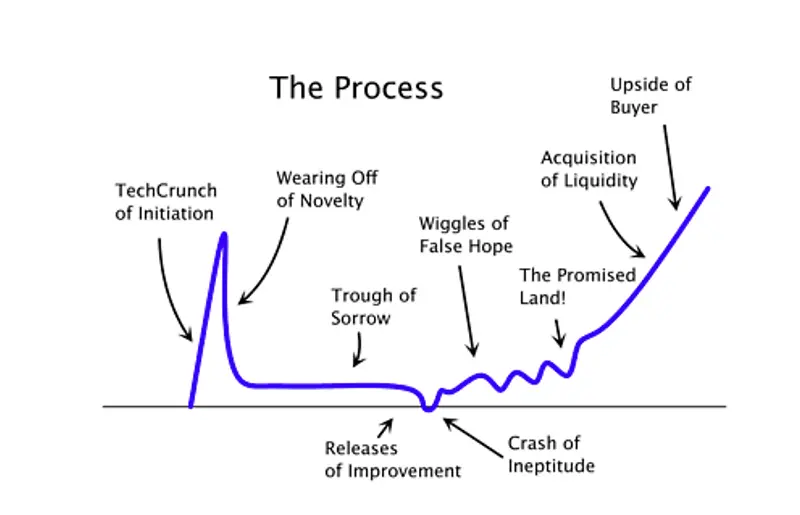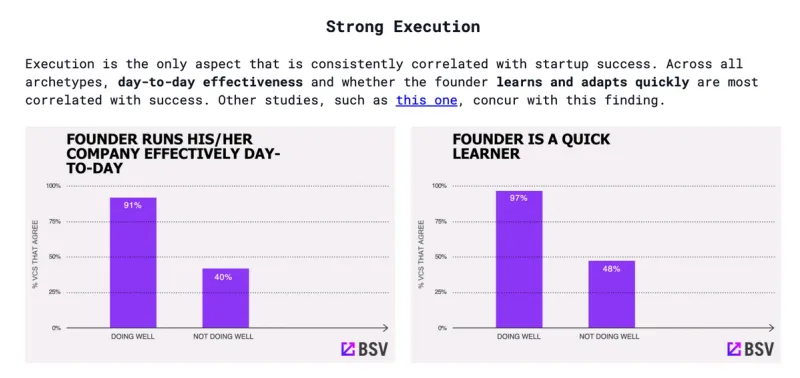
Business Startup Advice: 15 Helpful Tips for Startup Growth

Raise capital, update investors and engage your team from a single platform. Try Visible free for 14 days.
Building a startup is difficult. Being a founder can almost feel impossible. There are very few people that have been in the shoes of a startup founder. This means that there are very few people that know the difficulties that come along with building and leading a startup.
As a startup founder, you are responsible for hiring and retaining employees, securing capital, developing a product, building culture, and more. Chances are you haven’t lead all of those things in the past. Because of this it is important for you to look to the founders and leaders that have been there before to uncover advice.
Related Resource: 7 Essential Business Startup Resources
Check out our 15 helpful tips for startup success below:
1) Be Persistent
Leading a startup is full of ups and downs. Inevitably, things will not go as planned and will feel like everything is headed in the wrong direction. Paul Graham, Founder of YC, coined the term “trough of sorrow” to explain when your startup loses momentum and feels like things are all headed in the wrong direction.

In order to navigate troughs of sorrow and down periods, startup founders need to stay persistent. You’ll need to focus on what truly matters to your business and stay the course.
Related Resource: The 23 Best Books for Startup Founders at Any Stage
2) Always Be Solution Focused
As we’ve alluded to earlier, founders are pulled in a hundred different directions. — whether it be with hiring, fundraising, or developing a product. It is easy to get distracted and spend your time (and your team’s time) working on projects or initiatives that are not core to your business.
As a startup founder, it is important to stay focused on your solution and the problem you are solving. As Kyle Wong, the CEO of Pixlee, puts it,
“Having a product that does a lot of things but doesn’t do anything well is useless. Your goal should be to definitively say that your product is the best at doing X for market Y. You should ask yourself, “Which customers do I care most about, and what can I do to make their experience better?”
Determine what your company is uniquely good at and stay focused on that solution.
3) Invest in Yourself
When managing a team, it can be difficult to put yourself aside and continue to invest in the team members around you. As a startup founder, it is important that you take the time and resources necessary to invest in yourself. This will differ from founder to founder depending on they do this. For some it might be setting time off from work to hone other skills, attending leadership conferences, etc.
4) Execution, Execution, Execution
Forecasting growth and building a product roadmap is a task in itself. Executing those plans and roadmaps is vital, and difficult. In order for a startup to succeed, the leadership team needs to be focused on execution from day to day to make sure everyone is headed in the same direction.
As the team at Basis Set Ventures puts it, “Execution is the only aspect that is consistently correlated with startup success. Across all archetypes, day-to-day effectiveness and whether the founder learns and adapts quickly are most correlated with success.” Check out the image from their Founder Superpowers report below:

5) Focus on Results
Going hand in hand with execution is the ability to focus on results. It can be easy to get consumed by the inputs, but if the results are not there it is important to quickly pivot and try inputs and strategies that show real results.
Because most startups have a limited runway (cash) it is important to move quickly and stay rallied behind results. If you find a marketing or acquisition channel is not moving the needle, it is important to quickly cut that channel and focus on what is driving results.
6) Build a Reliable Network
The startup world is a tight-knit community. Different VC funds and corporations have made it incredibly easy for founders and startup employees to network and help one another.
Having a reliable network is a great way to help in all aspects of business building. Connections will be able to make introductions to potential investors, ideal customers, and job candidates. It is important to be thoughtful about the relationships you are building and focus on building trust before pursuing business interests.
As the team at Hustle Fund wrote, “Networking wasn’t about going to a bunch of conferences and exchanging business cards. Networking is simply about making friends.”
7) Protect Your Equity
Equity is the most expensive asset a startup founder has. It is important to protect and manage your equity accordingly. At Visible, we believe that startup leaders should have dedicated tools for managing their equity — just as sales and marketing teams have dedicated tools to manage their day-to-day.
Raise capital, update investors and engage your team from a single platform. Try Visible free for 14 days.
8) Become a Storyteller
Storytelling is a crucial part of building a successful startup. Sure there are more important aspects of business building but being a great storyteller will help immensely with fundraising, hiring, and messaging. As Steve Jobs puts it,
“The most powerful person in the world is the storyteller. The storyteller sets the vision, values, and agenda of an entire generation to come.”
Kristian Andersen of High Alpha joined us to discuss how founders can leverage storytelling to craft their pitch deck for successful fundraise. Learn more here or check out a snippet below:
9) Embrace the Journey
Building a startup is a journey. As we mentioned previously, there are many ups and downs when it comes to building a startup. While it can be easy to stay focused on the day-to-day it is important to take a step back and look at the journey. It is easy to focus on the lows but is rewarding to allow yourself and your team to celebrate the wins.
10) Don’t Let Yourself Get Burned Out
Building a successful startup requires solving a lot of difficult problems. At times it might feel like you are banging your head against the wall. It is easy to get consumed by a problem and put everything you have into solving it day after day. However, this can lead to burnout and cost you, and your team, in the long run.
In order to avoid burnout, it is important to make yourself, especially your physical and mental health, a priority. Learn more below.
11) Make Physical and Mental Health a Priority
Launching a startup is an exhausting job and can take a toll on a founder’s physical and mental health. As the team at Starting Line VC puts it,
“Building a startup is an exhausting process. It is terrifying, stressful, and confusing. It can also be exhilarating. The highs are higher than any other feeling; the lows depress similarly. As a founder remarked to us recently, “my mood is dictated daily by the performance of our Shopify revenue. If not managed and balanced, these volatile emotions can become unhealthy. Worse, they can affect performance.”
Learn more about managing your physical and mental health with Ezra Galston of Starting Line Ventures here.
12) Strategically Plan Out Every Work Day
If you’ve been following along, you have probably noticed that focus is a core aspect of startup success. Focus in everything from product development to your daily routine can help a company succeed. By having a strategic plan for each workday, you’ll be able to maintain that focus on the big problems you are solving. Of course, there is no one size fits all strategy to planning out a work day. Find what works best for you and stick to it.
13) Make Different Mistakes
Things never go as planned when building a startup. Mistakes are inevitable. The only thing you can do is learn from your previous mistakes and do your best to make them again. Mistakes are a great way to learn, especially as an early stage startup. You can’t let the mistakes weigh you down and have to be viewed as a learning opportunity that won’t happen again.
14) Progress Not Perfection
Many times it can be intimidating to put a product, pitch deck, email, blog post, etc. out before it is perfect. However, most startups are strapped for cash and need to balance speed with perfection. Of course, it would be ideal to have every aspect of your product be perfect, but that is not realistic. One of the differentiators of a startup is the ability to move quickly. In order to do so, you need to focus on the progress. Finding the right balance of progress and perfection is key to moving efficiently.
15) Know Your Customers
Without customers, a business fails to exist. Having a voice of your customers and a true understanding of their needs is a surefire way to make sure you are building the right product, sending the right message, and hiring the right team members. In order to know your customers, you need to take the time to understand their needs and build relationships with individuals.
Building relationships with customers will also reduce the likelihood of churn. Chances are your customers are working through the same things as you and will understand what you are going through. Scott Dorsey of High Alpha stresses that founders should be close to their customers than ever before when working through tough times. From our post, 4 Takeaways From Our Webinar with Scott Dorsey,
“During uncertain times, it is more important than ever to be close to your customers. Your customers are going through the same things that you are going through. Establish and preserve your relationship so you can grow together on the other side of the downturn.”
Learn Everything You Need to Know About Funding With Visible
Boiling down what it takes to build a successful startup into 15 tips is unrealistic. Some things may work for one company and not the other. The only way to truly understand what works for you and your business is by getting out there and doing it. At Visible, we want to be there along the way to help you with all things related to fundraising, investor relations, and metric tracking. Learn more about how we can help with your fundraising efforts here.
Related resource: Strategic Pivots in Startups: Deciding When, Understanding Why, and Executing How



